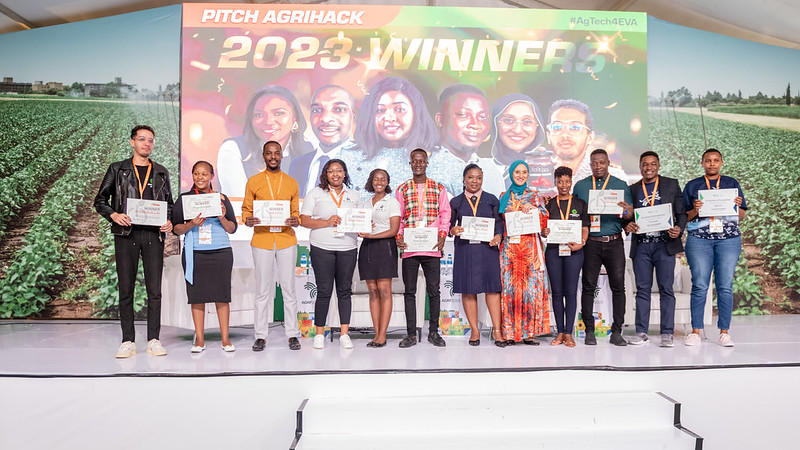In the heart of Africa, a vibrant and dynamic force pulses – the youth. Known for their resilience to recurrent crises across the globe, Africa’s youth are emerging triumphant, driven by their zeal, entrepreneurial mindset and innovative approaches to finding solutions to some of the gravest societal issues of our time.
Fueled by innovation, determination and a deep-rooted connection to their land, they have become catalysts of change, sowing the seeds of transformation across the continent’s food systems. Their different achievements and active contribution to positive change in their communities and beyond continue to inspire confidence in a brighter future for Africa.
Tech for transformation
Notably, in the face of the adverse effects of climate change and inadequate agricultural financing, many young people have leveraged new media and technology to access information on the best practices of modern farming and market trends for climate-smart agriculture. This knowledge has made a significant impact on our food systems, transforming family farms from modest subsistence gardens into thriving agribusiness ventures that fuel local and national economies.
Such innovative use of modern technology to gain impactful knowledge is confirmation enough that bridging the innovation and related funding gaps is the key to driving sustainable agricultural transformation in Africa. In fact, the Food and Agriculture Organization (FAO) predicts that Africa’s agricultural market will surge from $200 million in 2015 to $1 trillion by 2030, with agricultural technology driving this growth. However, the pace of uptake for agricultural technologies is still slow, with a recent study indicating that only 23 per cent of youth in agriculture use any form of agricultural technology.
Innovative initiatives for change
For a step change, several initiatives have been developed to drive the integration of technology in youth-led agricultural enterprises. One such programme is Pitch AgriHack, an initiative of AGRA, Heifer International and Generation Africa. Targeting young entrepreneurs aged 18 to 40 years old, the initiative runs a digital agriculture competition, whose winners are feted at the Africa Food Systems Forum, where the contestants get further opportunities to share their innovations with potential investors from around the world.
In the same way, the annual Agriculture, Youth and Technology (AYuTe) Africa Challenge awards cash grants of $1.5 million to promising young agritech innovators and social enterprises across the continent — enabling professionals to use technology to reimagine farming and food production in Africa. The AYuTe challenge is a catalyst for growth, combining a cash incentive with business development initiatives to translate the energy and ideas of young African innovators into meaningful impact for the continent’s farmers.
Many more initiatives across the continent are creating impact while leveraging global funding to unlock youth-led innovation. Another good example is Hello Tractor’s unique Pay-As-You-Go tractor financing service that facilitates affordable equipment rental services to smallholder farmers via a tech platform, driving the capacity of farmers to adopt mechanisation for increased productivity. The platform connects equipment owners with licensed booking agents who connect farmers with affordable tractors for lease. This unique model has not only strengthened the mechanisation market but also boosted commercial capital for all players across the ecosystem. Working with a $4.5 million grant, the initiative was piloted in Kenya, Nigeria and Uganda with remarkable success, unlocking $7 million in commercial capital from private investors.
The crowding effect
Currently, the continued rise of agritech startups is around providing real-time data on crop health, livestock administration and pest management, all of which increase productivity, connect smallholder farmers to markets and enable seamless transactions. Indeed, e-commerce platforms are already bridging the gap between rural producers and urban consumers, democratising access to nutritious food and eliminating exploitative middlemen to ensure that farmers receive fair prices for their produce. Meanwhile, as the world becomes increasingly interconnected through digital platforms, Africa’s youth are leveraging these linkages to collaborate beyond borders. While doing so, they are creating a transformative movement of pan-African networks for knowledge sharing, notably around sustainable agricultural practices, including irrigation, water harvesting and conservation and composting.
Africa’s youth: The drivers of sustainability
Drawing from these learning opportunities, the new generation of farmers now understands that unless we embrace sustainable practices, feeding the world’s population of 9.1 billion by 2050 will be a far-fetched dream. Working with gained knowledge on modern conservation methods, farmers are successfully optimising water usage through conservative irrigation techniques, while leading the uptake of organic fertilisation through homemade compost.
In urban areas, we are seeing young people breathe new life into neglected spaces by cultivating rooftop gardens and urban farms, which now provide fresh, locally-grown vegetables and spices for city dwellers while reducing the carbon footprint of food distribution.
Such innovation was evident at the recently concluded 2023 African Food Systems Forum (AFSF). Previously known as the AGRF Summit, the Forum explored not only the opportunities for optimising youth involvement in Africa’s food systems but also showcased some of the most promising and innovative agribusinesses led by young entrepreneurs across Africa. These youth are the lifeline of Africa’s food systems and they have demonstrated their ability to drive its transformation. To support them, bold action is needed from all stakeholders as young people are undeniably the living embodiment of resilience, creativity and the unwavering spirit of Africa.




